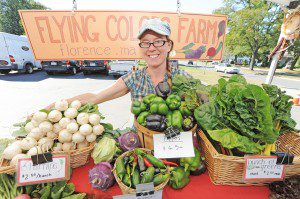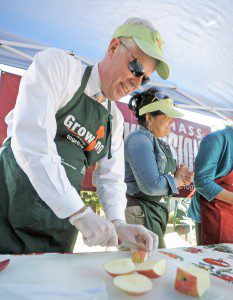
Julie Cummings, co-owner of the Flying Colors Farm in Florence, displays some of the fresh produce at the Westfield Farmers Market Thursday. (Photo by Frederick Gore)
WESTFIELD – Thursday afternoon, a small delegation from Beacon Hill led by a familiar face graced the lawn of Westfield’s Church of Atonement for the city’s farmers market, to speak on the importance of these markets and the state’s Supplemental Nutrition Assistance Program, or SNAP, which is administered through the federal government and the Department of Transitional Assistance.
Massachusetts Secretary of Energy and Environmental Affairs and former Westfield mayor Rick Sullivan was on hand to speak on the importance of the health of farmers markets in the state and the importance of the SNAP program.
According to the Massachusetts Department of Health and Human Services website, residents of the Commonwealth who participate in SNAP are “families with children, elders and disabled… Many are the working poor with limited income or those who are temporarily unemployed.”
In approved retailers throughout the state, the Electronic Benefit Transfer (EBT) cards are used by many residents, statewide, and participation in the program has increased dramatically over the past five years.
According to James Arena-Derosa, regional administrator for the United States Department of Agriculture’s northeast region, the program goes a long way towards eradicating malnutrition among the Commonwealth’s unemployed and working poor.
“It is the country’s front line defense against hunger in America,” he said. “Right now, over 47 million Americans participate in the program, which has gone up a lot in this recession.”

Richard K. Sullivan Jr., secretary of the Executive Office of Energy and Environmental Affairs, slices freshly picked apples at the Westfield Farmer’s Market as part of a hands-on demonstration at the UMass Extension tent. (Photo by Frederick Gore)
He said that one in five Bay Staters are eligible for benefits.
Arena-Derosa clarified that those with EBT benefits who participate in SNAP may only use their benefits on designated SNAP foods.
“About $80 billion was spent nationally on the SNAP program last year, $1.3 billion in Massachusetts,” he said.
Arena-Derosa said that the program only uses authorized SNAP retailers, but that the range of these retailers is expanding to not only include supermarkets, but also smaller grocery stores and bodegas.
He said that the program has an above average participation rate in Massachusetts, but that it also highlights some unfortunate consequences of the current economic status in the country.
“About 75 percent of the people that are eligible participate in the program,” he said. “But 30 percent of the people on SNAP are working. The last million jobs created in this country are part-time or low-paying and people are having a hard time making the numbers work.”
“We’re encouraging farmer’s markets to participate in the SNAP program, to use a point of service machine where people can take their SNAP benefits and use them at a farmers market,” he said. “We want to encourage the consumption of local, fresh, healthy food. It’s better for our clients that participate, it’s good for our local farmers, it’s good for our local economy.”
It was the state economy that Sullivan was eager to talk about Thursday, espousing the progress of the state’s farming industry as a big factor in the Commonwealth’s economic recovery.
“There has been a 27 percent growth in farming and farms in the Commonwealth of Massachusetts since 2007,” he said. “That is a significant part of the economy of Massachusetts, particularly in the central and western parts of the state.”
Sullivan attributed the rejuvenation of farming in the Commonwealth to people being more concerned with eating healthy, having more access to healthy food, food security, and wanting to know their family farmers.
“No one can deliver a safer, better, more healthy product than our local family farmers,” he said.
He also mentioned a number of programs that the state has established, such as farm to table initiatives, where fresh produce from local farms is being brought into public school systems statewide, as well as state colleges and universities.
“Massachusetts has the seventh most farmers markets of any state in the country,” he said. “The Patrick administration has preserved 110,000 acres of property in Massachusetts. Many of those acres are farms. Our farming activities are an important part of what makes up the quality of life in the Commonwealth of Massachusetts.”
“This is fabulous,” said Maureen Belliveau, director of the city’s Business Improvement District, after the event. “Having been involved with the farmer’s markets from the beginning, this means a great deal. We’re only going to continue to grow.”

